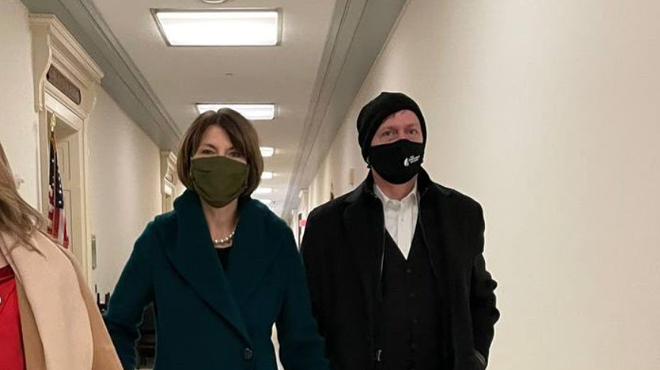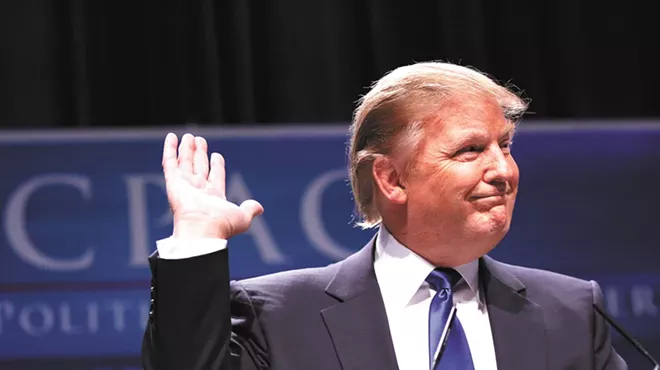That's not even counting his long record of other outrageous statements, or his persona being so controversial that it sparked a 4,000-word Rolling Stone article, or the recent debate over whether a document he authored was calling for men who didn't follow Biblical law to be killed or was just describing Old Testament doctrine.
So this year, Matt Shea's opponent, Ted Cummings, thought he'd have a pretty good shot of getting the Spokesman-Review's editorial board endorsement. In 2012 they endorsed Democrat Amy Biviano instead of Shea. In 2014, they endorsed Republican Josh Arritola. They didn't endorse a candidate in the race in 2016, but that was because Shea's opponent wasn't even running a campaign.
Either way, Cummings thought it would be like the previous years when the editorial board reached out, sat down with candidates and then made its choice.
"I assumed at some point they would contact me," Cummings says. But they didn't.
Instead, he opened the paper on Oct. 18 to find that the Spokesman-Review had given his race a "no good choice" non-endorsement, explaining that Cummings drew "much of his support from unions" and "generally aligns himself with causes more liberal than his deeply red district."
Cummings was peeved.
"The whole thing blindsided me," Cummings says. "It’s so irresponsible for a local paper to take no position."
Not only that, but he had no idea who actually was behind it. In previous years, the Spokesman-Review has made it clear who was on its editorial board. Here's who how its editorials looked in 2006:
But here's how it looks today:
Cummings says he even tried, unsuccessfully, to get a Spokesman-Review reporter to spill the beans on who was responsible for the endorsement. (Spokesman-Review reporter Chad Sokol disagrees with this characterization and says he laid out, to the best of his knowledge, how the endorsements are made — and a volunteer coordinator with Cummings' campaign backs up Sokol's account.)
But either way Cummings says he remained unclear on who at the Spokesman-Review decided not to endorse him.
"I have no idea to this day who it is," Cummings says.
So what's the deal with the Spokesman-Review's endorsements? Who's making them and why isn't the editorial board interviewing candidates anymore?
"Well, it’s the same as it’s always been," Spokesman-Review Managing Editor Joe Palmquist tells the Inlander. "Basically the difference is that the editorial board is now a board of one."
Thanks to cuts, layoffs and buyouts, the editorial board has been winnowed down to only one man: Publisher Stacey Cowles. Cowles gives his opinion to an experienced freelance writer — Palmquist declines to identify who — and the writer writes it up. (Cowles did not respond to a phone call last week requesting an interview.)
The wealthy Cowles family has long been a powerful and, at times, controversial force within the Spokane region. Along with the Spokesman-Review, the Cowles Company owns major real estate properties, including River Park Square and the M apartments. For about a decade, their role in the River Park Square parking garage scandal made the Cowles favorite subjects of local conspiracies.
The Cowles Company also owns the Inland Empire Paper Company, which regularly struggles with environmental regulations.
In fact, that connection was made explicit in the paper's endorsement of U.S. Rep. Cathy McMorris Rodgers: Environmental standards could hurt the business interests of the Cowles Company.
She believes that the Snake and Columbia river dams continue to benefit the region and she opposes environmental regulations that overreach. That includes her criticism of the federal standard on PCB discharges into waterways – a standard that is now being re-examined but that is 25 times more restrictive than the guideline agreed to by Washington state officials. We, along with many local and statewide businesses and organizations, believe the less-strictive standard is better policy. Meeting EPA’s standard would cost municipal sewer users hundreds of millions of dollars and could eliminate recycling at Inland Empire Paper, a subsidiary of Cowles Co., which also owns this newspaper.Not mentioned in the editorial, however, is that it was Cowles himself who was making the argument. In an Inlander letter to the editor last week, reader Merilee Corbit objected to the lack of transparency.
First, it is hypocritical — the Spokesman-Review will not publish unsigned letters to the editor. Second, failing to point out whether the letter was written by a Cowles family member could be an attempt to mask the bias at its base — the Cowles benefit from McMorris Rodgers' vote for a tax plan that lets wealthy families avoid an inheritance tax and, as owners of Inland Empire Paper Company, the Cowles profit from McMorris Rodgers' support for the Republican Party's efforts to remove environmental protections
And she's just one of many readers who've complained about the Spokesman-Review endorsement process recently.
Dave Trimmer, a former Spokesman-Review sportswriter, wrote a letter to the editor to the Inlander this week, taking issue with the newspaper's lack of endorsement in the Shea-Cummings race.
"The newspaper should encourage voting rather than insinuate we don't deserve representation," Trimmer wrote. "It would have been better to ignore us than insult us."
Meanwhile, Tallman Trask, spokesperson for the Alliance for Gun Responsibility, sent the Inlander an email rattling off a panoply of alleged factual inaccuracies in the paper's endorsement against Initiative 1639.
"The editorial claims that victims of gun thefts during home break-ins could be held liable under 1639's storage element, but 1639 specifically exempts those circumstances," Tallman writes. "The editorial claims that 1639 storage provision could make firearms 'inaccessible in an emergency,' but again 1639 doesn't require any particular type of storage, or storage at all. While it would probably be a bad idea, there's nothing in 1639 that would make it illegal to simple leave a gun on a nightstand."
I kind of feel a little sorry for Stacey [Cowles] right now. It is tough. He’s on his own."
The Spokesman-Review's endorsements have long leaned conservative. They endorsed Romney in 2012 and McCain in 2008, though the S-R, along with almost every newspaper in the country, endorsed Clinton over Trump.
But there would also occasionally be surprises: For example, in 2012, they endorsed Democrat Dennis Dellwo over Republican Jeff Holy.
Still, Stacey Cowles always had the final vote. It wouldn't be unusual to see Spokesman-Review editorials continually criticizing politicians, only to turn around and reluctantly endorse them come election season.
"Stacey Cowles always got the final vote anyway," Palmquist says. "Now he just doesn't have as many people to bounce it off of. ... I kind of feel a little sorry for Stacey right now. It is tough. He’s on his own."
Last year, Palmquist says, Cowles had Opinion Editor Gary Crooks balancing out his conservative views on the editorial board. (Heck, earlier this year, Crooks actually worked for the Lisa Brown campaign in her race against McMorris Rodgers.)
The biggest change has not so much been about who gets endorsed as about the process. In an email to the Inlander, Crooks summed up how the endorsement process had worked:
We endorsed in primary and general. (No primary endorsements this year). The process would start with inviting candidates to in-person interviews with the board during the primary. We would interview people in races with more than two candidates. Then we’d discuss them and make recommendations. Publisher was always the ultimate decider. Editorial page editor and editorial writers would write them. At the end, it was just me. Think there were five of us when I joined (2002). All board members names were on the page’s masthead, so while the editorials weren’t signed, readers could see who was on board.
If a race had just two candidates, we’d wait for the general, knowing they would both advance. Then we’d interview and endorse. Same with both sides of an initiative.
Almost all candidates agreed to be interviewed. It is a lot of work, and a logistical challenge to get everyone scheduled.
But today, not only were there no endorsements during the primary, there were few if any endorsement interviews.
Jessa Lewis, dogged by dirty tricks in a narrow race against Jeff Holy for state Senate, was frustrated that she never got to make her case before the editorial board before Cowles concluded that "her progressive political views — pro-choice, pro-gun control, pro-welfare — aren’t likely to sit well with the district’s voters."
Cowles didn't reach out to talk to Lisa Brown, either, before he endorsed McMorris Rodgers.
"I would have appreciated the opportunity to talk about what's at stake in this election — especially regarding the disconnect between Rep. McMorris Rodgers' talking points and actions — and map out why I'd be a more effective congressperson," Brown said in a statement.
But it wasn't just Democrats who didn't get an interview. Republican Dave Lucas, who has been frustrated that he never got a chance to do a one-on-one debate with Democrat Timm Ormsby, didn't get a sit-down with the Spokesman-Review publisher either.
"I sent them a couple of press releases with information and updates," Dave Lucas writes in an email. "I never heard anything back from them each time."
Cowles didn't talk to county clerk candidate Michael Kirk, treasurer candidate David Green, Spokane County commissioner candidate Robbi Anthony or 6th Legislative District candidate Jenny Graham.
Palmquist says Cowles did meet with some people, but that those meetings were generally initiated by the politicians.
"I think his first year in transition has been difficult," Palmquist says.
A lot of the logistical pieces in prior years had been handled by the larger editorial board. Next year, Palmquist suggests, the newspaper may have to make adjustments and set up a schedule to get candidates in front of Cowles.
Either way, Palmquist stresses, one important distinction will remain clear:
"We still maintain the line of the newsroom and the editorial board," Palmquist says.
"We don’t have any say over of any of the endorsements," he says of the news side of the paper. "It’s still independently operated from another part of the building."
The misconception that a newspaper endorsement actually signals how a newspaper's reporters feel is a longtime pet peeve for many reporters.
"It’s a pain in the ass for our newsroom," Palmquist says. "People assume it's how the newsroom feels. Even if it's directly opposite of how the newsroom feels. You will get people endorsed that the newsroom doesn’t like at all, not because of the politics, but because they’re not very nice to you."
That's one reason why Inlander Publisher Ted S. McGregor stopped doing official newspaper endorsements back in 2014:
"I don't want any reader to confuse the opinions in our Comment section with our news stories. Not everybody understands the difference. And I don't want anyone to judge all the great things we do every week because of one endorsement, which, by definition, is a contentious thing."That's not to say that McGregor always stays out of the fray. Just this week, McGregor encouraged voters to vote for Lisa Brown as a vote against Donald Trump. But he did so under his own name, with a specific disclaimer: "The Inlander does not do formal candidate endorsements. Ted S. McGregor is the publisher of the Inlander; his opinions are his own."
No matter who's endorsed, Palmquist says, the paper is often flooded with angry demands from readers making generally empty threats to cancel their subscription.
"They always threaten to cancel," Palmquist says. "If the amount of people who said they would cancel really did, we’d feel the impact."
Ultimately, the Spokesman-Review may have actually profited a bit because of the decision to not endorse in Shea's race. After being frustrated over his debate with Shea and the Spokesman's non-endorsement, Cummings took matters into his own hands, paying the Spokesman-Review almost $2,500 to run a full-page ad decrying Shea and the Spokesman's rationale for not endorsing him.
"I have been accused of being too 'far left of the majority of the district's voters,' so help me understand why someone would say that," Cummings writes. "I proudly stand for the Pledge of Allegiance and the National Anthem. I hunt with a rifle and a bow and respect the rights of others to do the same."
Today, Cummings doesn't just say that Cowles made a mistake with the paper's endorsement. Cummings says Cowles is culpable.
"Whatever happens if Matt Shea gets re-elected, he owns it," Cummings says. "I think it's unprofessional. I think it’s lazy. I think it’s reprehensible."





























